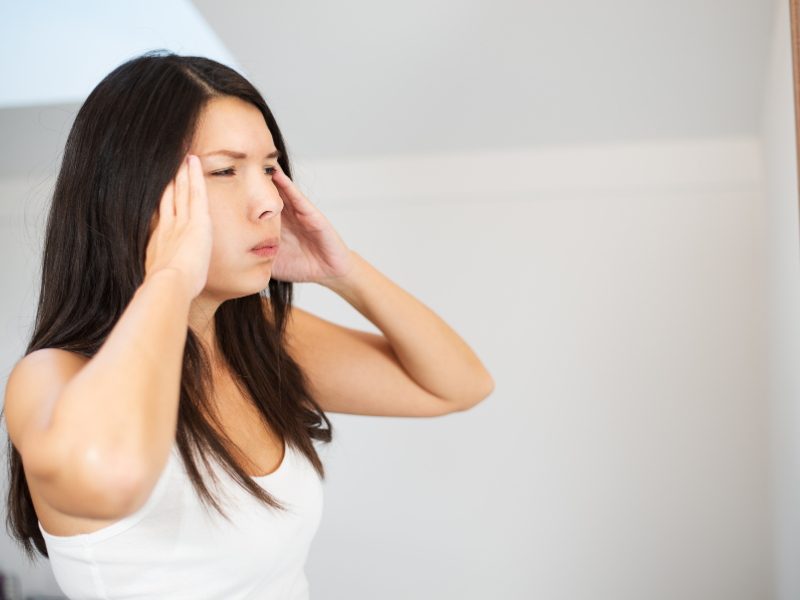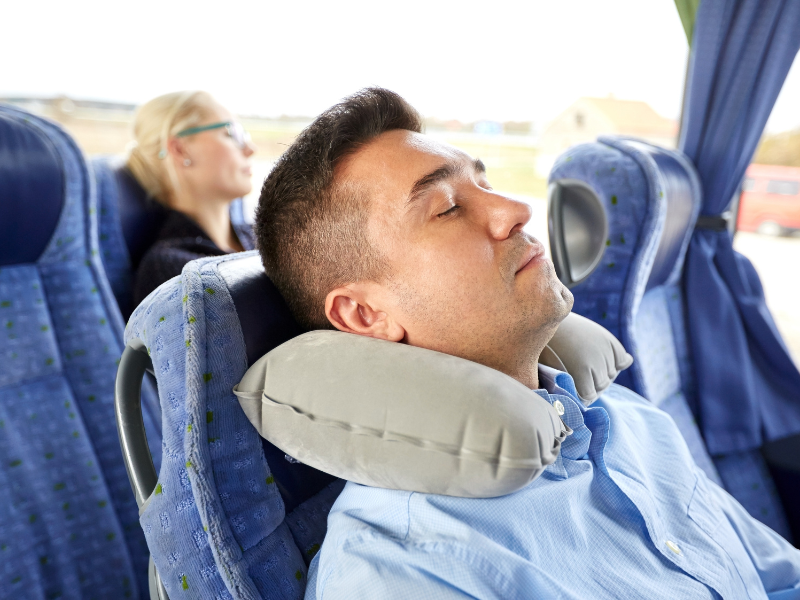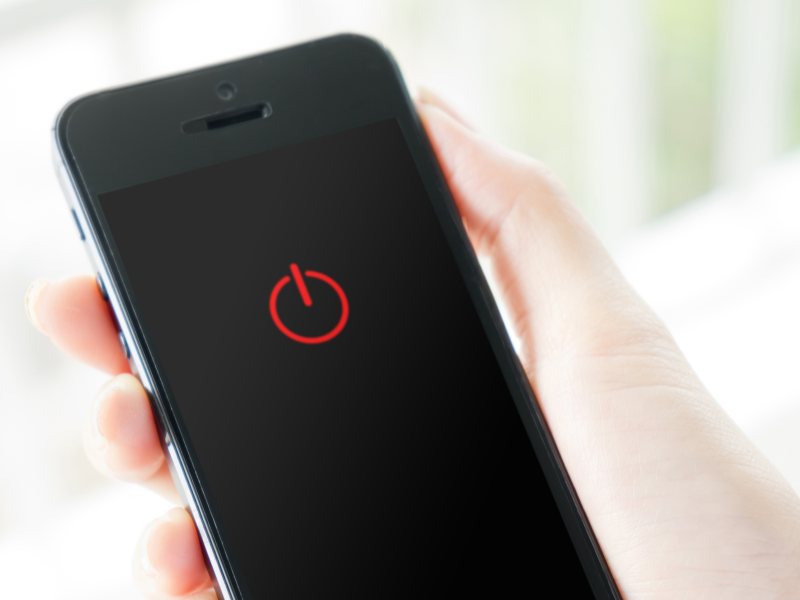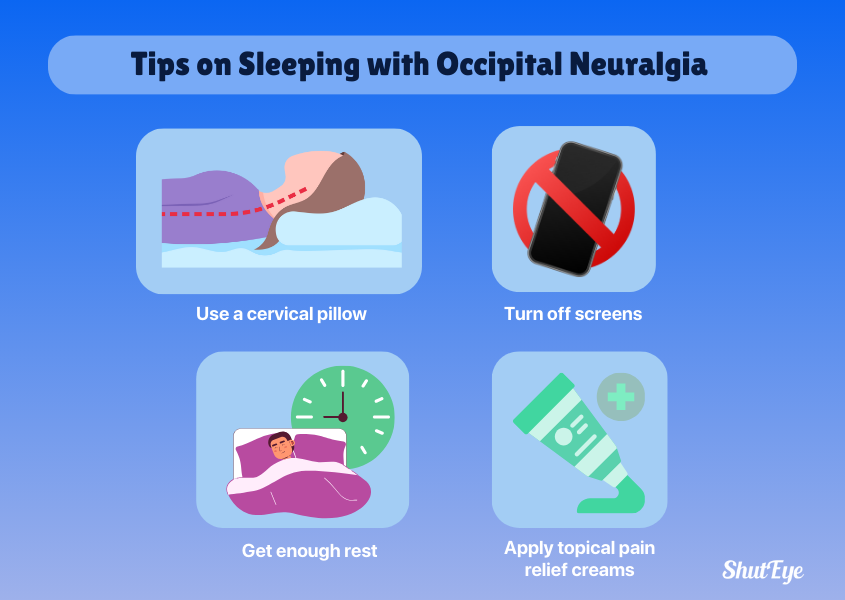


Any form of pain, especially occipital neuralgia, makes it difficult to get a decent night’s sleep. Since the nerve irritation that causes this kind of headache will make it worse, applying pressure to the nerves will make it worse. Because sleep is vital for health and well-being, it’s important to learn what is the best way to sleep with occipital neuralgia to alleviate headaches.

Occipital neuralgia is defined as a condition in which the occipital nerves are injured or inflamed. This results in headaches that can feel like a severe piercing or throbbing. It can also cause a shot-like pain in the upper neck, back of head and behind the ears [1].
Besides headache, some of the common symptoms of occipital neuralgia include:
This condition can be caused by pinched nerves or muscle tightness in the neck. It can also be caused by a head or neck injury.
Occipital neuralgia is a rare illness, although it can be difficult to diagnose because migraine headaches can mask it. There could be a lot more incidents than what has been reported. The occipital nerve becomes inflamed due to migraine headaches, which can affect the back of the head on either one or both sides. Instead of being diagnosed with occipital neuralgia, the person with the headache is given a diagnosis of a migraine that is irritating the great occipital nerve.

There are other lifestyle adjustments in addition to finding the best way to sleep with occipital neuralgia. Caffeine, for instance, is incompatible with occipital neuralgia. Coffee use causes the blood arteries surrounding the brain to constrict, and caffeine dependence develops in the brain. Coffee deprivation causes the blood vessels to swell. For this reason, those who stop drinking coffee but do not experience occipital neuralgia experience excruciating headaches.
Therefore, avoiding caffeine is part of the best ways to sleep with occipital neuralgia. Avoiding processed sugar and eating fresh vegetables and fruit are further lifestyle adjustments. To loosen up tight neck muscles, you can also perform simple workouts.

If you have occipital neuralgia, there are certain things you may take to help you sleep well at night. Try these more natural remedies before visiting an ENT doctor if the discomfort doesn’t go away or keeps you up at night.

While you sleep, a cervical pillow supports your head and neck. It assists in maintaining spinal alignment, which can lessen discomfort. A cervical pillow can relieve pressure on your neck’s nerves if you have occipital neuralgia. You can enhance your quality of life and decrease pain by having your spine properly aligned. Ask your ENT physician about using a cervical pillow as one of the best ways to sleep with occipital neuralgia. They might be able to recommend one to you so you can have the finest possible night’s sleep.

Many individuals stare at screens all day long, whether on their phone, computer, TV, tablet, or e-reader. Even if daily living needs to use displays, it’s crucial to give your brain and eyes a vacation from the harsh light of technology. The light from a computer screen might make patients with occipital neuralgia sensitive and worsen their headaches.
Turning off your screens at least an hour before you go to bed is one of the best ways to sleep with occipital neuralgia, as it helps your thoughts unwind and gives your eyes a break.
Because occipital neuralgia can be exhausting, getting enough rest and giving your body time to heal is crucial. Your health and wellness, which in turn depend on your body’s capacity for self-healing, are necessary for being productive during the day. It’s up to you to arrange enough time to get enough rest and find the best ways to sleep with occipital neuralgia, but having the correct pillow, doing yoga, and turning off your screens can all help.
To adhere to this rule, get an analog alarm clock and leave your phone in the living room when you go to bed. Avoid sitting in bed to watch TV or using the computer because you won’t be able to support your head and neck comfortably.
Some people with occipital neuralgia utilize topical painkilling lotions and ointments to relieve muscle soreness. Popular choices comprise:
Applying topical pain relievers right before bed is a great way to help you fall asleep and remain asleep. You can also wear them all night. Consider incorporating cream or gel into your self-massage regimen to improve the therapeutic advantages of topical pain treatment. This is one of the very best ways to sleep with occipital neuralgia.

Even though occipital neuralgia is challenging to diagnose, it is crucial to visit a pain specialist to ensure the pain is not caused by something else medical.
A pain management physician can assist you in developing a treatment plan and understanding your condition. In a nutshell, there is no one best way to sleep with occipital neuralgia.
American Association of Neurological Surgeons (2024) Occipital Neuralgia [online]. Available at: https://www.aans.org/en/Patients/Neurosurgical-Conditions-and-Treatments/Occipital-Neuralgia
Suni, E. (2023) Light and Sleep [online]. Available at: https://www.sleepfoundation.org/bedroom-environment/light-and-sleep#:~:text=Light+exposure+at+night+can,deeper%2C+more+restorative+sleep+stages.